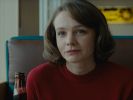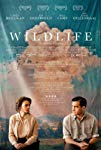Eye For Film >> Movies >> Wildlife (2018) Film Review
Wildlife
Reviewed by: Anne-Katrin Titze

Joe Brinson (Ed Oxenbould), the 14-year-old protagonist of Wildlife, a highlight of this year's New York Film Festival, has been given such a bland first name by his parents so that he could go anywhere and be anybody. Feeling trapped, going places, struggling for survival and retaining dignity are the marrow of Paul Dano's impressive, devastatingly piercing directorial début, which he adapted together with Zoe Kazan from Richard Ford's novel.
An avid observer, Joe is our eyes and ears. We behold the world through him and with him - which is not the same. It is 1960. His family recently moved to a small town in Montana, where his father Jerry (Jake Gyllenhaal) works at a golf course. His mother Jeanette (Carey Mulligan), a former substitute teacher is, by the father's decision mostly it seems, a housewife and mother now.

Softly, almost imperceptibly, Dano with his cinematographer Diego García (Gabriel Mascaro's Neon Bull), production designer Akin McKenzie (Todd Solondz' Wiener-Dog) and costume designer Amanda Ford (Alex Ross Perry's Her Smell also screening in the Main Slate of the 56th New York Film Festival, Queen Of Earth, Listen Up Philip) visually divides the story in three parts, the first of which is punctuated by blotches of turquoise, the colour of the father. We first see him from afar in a greenish-blue shirt playing ball with his son at dusk in front of their beige-yellow, slightly tattered working-class home.
How much Joe has to figure out about reading the adults around him is shown in a brilliantly puzzling scene. We see the father kneeling in the dirt in his khaki pants while cleaning out the spikes of two players' shoes at the golf course. Beer cans are on a small table. The father is scolded, which leads to his firing, the reasons for which remain opaque while explanations are many. Was this humiliatingly subservient gesture an instant of being "too friendly?"
When Jerry "overstepped boundaries with customers," in which direction did things actually go so terribly wrong? The mystery of that wrong is perfectly kept intact by Dano, who makes us share the perspective of the teenager figuring out this messy world. The father, struggling with self-worth and ways to feed his family decides to go north to fight the raging wildfires that threaten the area. Gyllenhaal makes this angry, proud, disappointed, loving man fully come alive with all his explosive tenderness.
Landscape and music and everyday objects are used to splendid effect. A moody pink sky is accompanied by a soundtrack that echoes a far-away train and a flute. The kitchen rubber gloves are pale green and foreshadow what Jeanette calls her "desperation dress," a taffeta creation in the same hue with the most beautifully cut back.
Joe takes an after-school position at a photographer's studio. A girl from his class advises him during a lesson on wildfires that "you don't need to take notes" because "when it happens it's already too late." The scene takes place outside, while they sit on the grass.
A brilliant Carey Mulligan dominates the second part of the film, with lavender hues. They culminate into chartreuse defiance. She is a woman pushed to her limits, as she tries to come up with any sort of plan for her family's future. She finds a job as a swimming instructor after her husband lost his. This is where she meets Warren Miller (Bill Camp - Yorgos Lanthimos's The Killing Of A Sacred Deer, Jeff Nichols' Midnight Special), a war veteran, much older than she, not much to look at, but the wealthy owner of a car dealership in town, among other businesses.
Unresolved conflicts hang in the air like stale discoloured tinsel that needs to be pushed aside, precisely because it is a reminder of better days that don't really matter anymore in the present. The power of all this nuance lies in the fact that the story does not take place in limbo but is about a family's physical and spiritual survival. When the son becomes more than a witness, when parents confess too much to a child or ask inappropriate advice, it is the adults' terrible loneliness - more than anything - that gets exposed.
"What kind of man leaves his family in such a lonely place?" Jeanette muses out loud. The compositions of isolation are exquisite. One such frame shows a children's toy horse ride in front of a supermarket in the front right, balanced in the far left down the street, where on the back of a truck you can spot a dog waiting for his owner.
During a mother/son trip into the forests to check out the fires, Mulligan wears a brown jacket with white spots which makes her resemble a deer. Joe asks her what happens to the animals when the fire approaches. There is a dreamlike quality to a number of scenes. "I feel like I need to wake up," Jeanette tells her kid, "But I don't know what from or where to." Soon a pale lavender car answers one of her questions.
Mr. Miller, "who fought in two wars" tells Joe after a dinner at his house, a story about himself. It is the only story we get straight from this man whose appearance and actions speak louder than his words. In any case, the story he tells is about flying in his aeroplane and turning off the engine sound when he encountered a flock of geese in V-formation.
It was like seeing an angel, he explains this most wonderful memory for him, that made him forget his four businesses, his wife, and his mother, whom he didn't care about at all in this instant. Next, Miller offers the boy a glass of wine with the following toast: "Here's to the angels and to your old man not being burnt up like a piece of bacon."
The scene is funny and disturbing and perfectly transports us back to those moments in childhood when it seemed impossible to figure out the motives of the people around you. Is this guy merely humblebragging about his plane and his businesses? Showing his animal loving soft side? Misleading the son to get to the mother?
Dano's Wildlife puts us right there at the verge of a comprehension that also contains a loss. The miraculous lies in the questioning.
Reviewed on: 19 Sep 2018


















